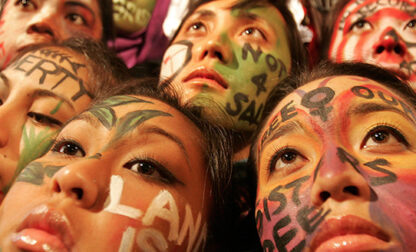Preventing bias
Employees frequently appear on radio and TV news programs as panelists asking questions of newsmakers; such appearances are encouraged.
However, there is potential for conflict if staffers are asked to give their opinions on issues or personalities of the day. Advance discussion and clearance from a staffer’s supervisor are required.
Employees may speak or teach at the invitation of news industry groups and educational institutions. The AP accepts reimbursement of expenses for such appearances if the event is one that AP would not routinely participate in. AP staffers may accept honoraria, with a supervisor’s approval, for appearances and teaching that require substantial preparation. We do not normally accept honoraria for routine speeches and panel discussions. We avoid addressing, or accepting fees or expenses from, governmental bodies; trade, lobbying or special interest groups; businesses, or labor groups; or any group that would pose a conflict of interest.
To avoid any conflict of interest or the appearance of any such conflict, AP employees must abide by the following rules and guidelines when making personal investment and financial decisions.
Inside information: All employees may not act upon, or inform any other person of, information gained in the course of AP employment, unless and until that information becomes known to the general public. Employees must comply with federal and local laws concerning securities and financial transactions, including those prohibiting actions based upon inside information.
Family investments: Employees are expected to make every effort to ensure that no spouse or other member of their household has investment or business interests that could pose a conflict of interest. Such a conflict may make it inappropriate for the employee to accept certain assignments. Employees must consult with their managers before accepting any such assignment.
Divestiture: Employees might be asked to divest or to suspend any activity involving their holdings. They will have one year from the date of request to do so.
For business reporters and editors: Employees who regularly write or edit business news must not own stock or have any personal financial investment or involvement with any company, enterprise or industry that they regularly cover for the AP. A technology writer, for example, must not own any technology equities.
New business staff members should immediately disclose such holdings to their manager or to HR. Staff members who are temporarily assigned to such coverage must immediately notify a manager of possible conflicts to determine whether the assignment is appropriate.
Writers and editors who cover the stock markets may not own stock in any individual company. They may invest in publicly available diversified mutual funds.
Business news employees must avoid speculative, short-term investment activities such as day-trading individual stocks or commodities.
Editorial employees are expected to be scrupulous in avoiding any political activity, whether they cover politics regularly or not. They may not run for political office or accept political appointment; nor may they perform public relations work for politicians or their groups. Under no circumstances should they donate money to political organizations or political campaigns. They should use great discretion in joining or making contributions to other organizations that may take political stands.
Non-editorial employees must refrain from political activity and contributions unless they obtain approval from a manager.
A supervisor must be informed when a spouse or other members of an employee’s household have any ongoing involvement in political causes, either professionally or personally.
Those who work for the AP must be mindful that opinions they express may damage the AP’s reputation as an unbiased source of news. They must refrain from declaring their views on contentious public issues in any public forum, whether through blogs, social networks, comments pages, petitions, bumper stickers or lapel buttons. They must not take part in demonstrations in support of causes or movements- or contribute to them in any way.
Preventing favoritism
If a reporting trip is organized, and we think the trip is newsworthy, we go and pay our way. If we have a chance to interview a newsmaker on a charter or private jet, we reimburse the news source for the reasonable rate of the costs incurred – for example, standard airfare. There may be exceptional circumstances, such as a military trip, where it is difficult to make other travel arrangements or calculate the costs. Consult a manager for exceptions.
Employees must not ask news sources or others they meet in a professional capacity to extend jobs or other benefits to anyone. They also must not offer jobs, internships or any benefits of being an AP employee to news sources.
We do not accept free tickets to sports, entertainment or other events for anything other than coverage purposes. If we obtain tickets for a member or subscriber as a courtesy, they must be paid for, and the member or subscriber should reimburse the AP.
Associated Press offices and staffers often are sent or offered gifts by sources, public relations agencies, corporations and others. Sometimes these are designed to encourage or influence AP news coverage or business; sometimes they are gift bags handed out routinely to journalists covering a particular event.
Whatever the intent, we cannot accept such items; an exception is made for trinkets like caps or mugs that have nominal value, approximately $25 or less. Otherwise, gifts should be politely refused and returned, or if that is impracticable, they should be given to charity.
Books, DVDs and other items received for review may be kept for a staff member’s professional reference or donated to charities, but may not be sold or raffled off for personal gain. In cases where restrictions forbid transfer to third parties, these items should be discarded. Items of more than nominal value that are provided for testing, such as electronics, must be returned.
AP staff should pay their expenses at meals with news sources. When several journalists are invited to an event with news value, such as a dinner with a senior official, staff may accept so long as an effort is made to reciprocate with the official or a staff member.
AP and its employees may accept discounts from companies only if those discounts are standard and offered to other customers.
We do not accept unsolicited contest awards from non-journalistic organizations or any organization that has a policy or financial interest in our coverage; nor do we enter such contests.
The aim in all matters involving contests should be to underscore the AP’s reputation for objectivity.
Other work
Employees may not serve as official scorers at sports covered by AP.
Individuals who seek to engage in non-AP work are subject to the following restrictions:
- Freelance work must not represent a conflict of interest for either the employee or the AP.
- Such activities may not interfere with the employees’ job responsibilities, including availability for newsgathering.
- Such activities may not exploit the name of The Associated Press or the employee’s position with the AP without permission of the AP.
- Employees who wish to use material they accumulated in their AP work – notes, stories (either written or broadcast), images, videotape, graphics – for other-than-AP uses must seek written AP approval, copyright clearance and a license to syndicate. This approval must be received prior to submission to any outside publisher, purchaser, organization or broadcaster, or to posting on websites or social networks. Under no circumstances should the AP incur expenses for research material that is not used for AP purposes.



